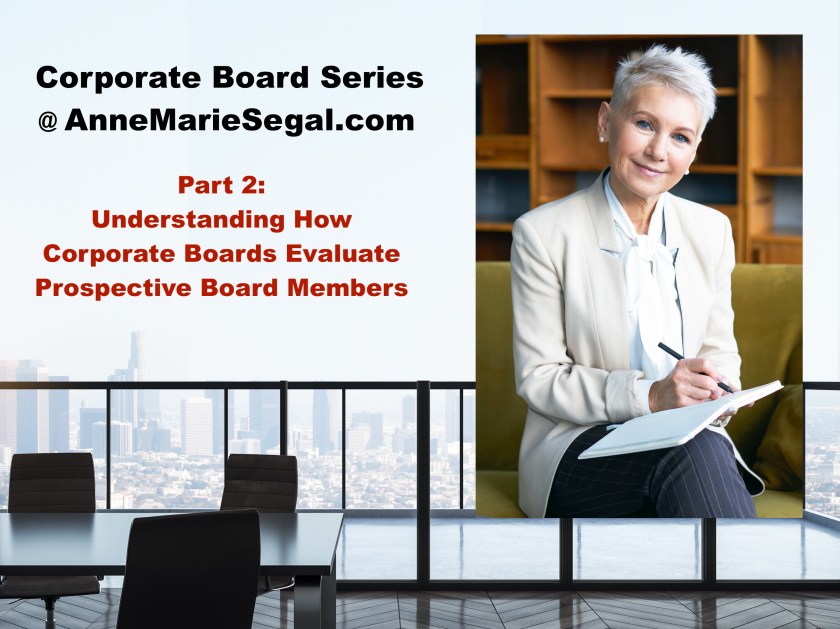
In my prior article on corporate boards, I explored how you can build out and articulate your vision for board service. This time, I will take the other perspective. What do (and should) corporate boards have in mind when they evaluate prospective board members?
The list of board-ready qualities is long, and in almost every case it will include:
- culture fit
- expertise
- thoughtful engagement
- integrity
A company might have different ways to express the above, and it will often add other important factors to the list, such as international experience. As a concrete example, here is the list of independent board candidate qualifications for Colgate-Palmolive.
Let’s explore each of these four core qualities in more depth:
Culture Fit. Just as a prospective employer is looking for candidates who would be a fit for the culture of the organization, so is the board of directors. At the same time, you need to be a fit for the specific culture of the board itself.
Here is an article by three leaders in board recruitment at SpencerStuart that speaks further to the importance culture fit on boards, including ways to help define this elusive concept. As a prospective board member, you will be well served to learn as much as you can about the board and company culture – including who are the heavy hitters and how they drive the board conversation – so you can both appeal to the board that you are a fit and determine (for yourself) that you actually are.
Many nominating/governance committees are (thankfully) moving away from using “fit” as a proxy for compiling a homogenous board. Diversity continues to be a priority for board refreshment among many of the surveys of board trends.
Expertise. Another key aspect boards use to evaluate candidates is their expertise across the range of areas that the board would need to span. Financial acumen is clearly one area of expertise that is in high demand, but it is not the only one. Leadership expertise is also clearly important, and this couples with an ability to appreciate (and put into practice) the role of the board as providing oversight, not “doing” the work of running the company.
As Betsy Atkins illuminated in her interview with Alexander Lowry on Boardroom Bound (see episode #30), board candidates should think about where they can add the most value in differentiated expertise. For example, she notes that you may have functional skills (like financial, marketing or product expertise), specific industry knowledge (such as deep domain expertise in steel or financial services) and/or stage-of-company expertise (such as with taking early-stage companies public, turnarounds or large-cap global multinationals).
It also pays to do some research into how your functional role can add to the board composition. For example, if you happen to be a General Counsel (GC) and seeking a board role, as many of my clients are, you will want to be able to articulate what General Counsel can add to boards (even if the company already has a GC, as they likely will). Since often the value a GC brings to the company cannot be easily expressed without an understanding of the big picture – which is harder than saying you brought revenues from $X to $Y – finding another way to get your message out there can help boost your candidacy while adding to your cache (#4 below).
For example, here’s an article in Modern Counsel about Audrey Boone Tillman, EVP and GC of Aflac, that highlights both her work on corporate governance and regulatory compliance and her appreciation of cultural differences in a very readable manner. It would be tough to communicate the same breath, depth and range of compatible skills in a few bullet points or sentences on a resume or board biography.
Articles such as this one demonstrate not only individual skill sets but also what a candidate brings to the table as a “full package.” (Note: I am not commenting on Ms. Tillman or anyone else’s motivation for the article, simply speaking to its effectiveness.) For executives who have access to company-generated or external media coverage that can help tie together the threads of their careers, it is worthwhile to invest the time to create a compelling and cohesive career narrative.
Thoughtful Engagement. Boards consistently state that they want members who will be actively engaged in meetings and are not afraid to ask the tough questions. One way to demonstrate your potential for engagement as a board candidate is to be apprised of the top issues facing boards today. (Note: For public companies, the NACD public company governance survey offers key insights, and many of these translate for private companies as well.) Another is to have and make known a genuine passion for the company itself and its customers. Further, as most board recruitment is through connections, being known as someone who is actively engaged in your current role(s) will position you as an attractive candidate for a board.
Integrity. With the increased scrutiny on boards, it also goes without stating (but should be included for completeness) that boards are placing greater value than ever on a board candidate’s integrity. In most cases, in fact, this is the most important quality a board member can have.
Copyright 2020 Anne Marie Segal. All rights reserved.
For a preview of future articles in the Corporate Board Series, click here.
For links to more corporate board resources, click here.
Anne Marie Segal is an executive coach, resume writer and author of two well-received books on interviewing and career development. She served as a corporate attorney for 15 years, including roles at White & Case LLP and a prominent hedge and private equity fund manager, before launching her coaching practice.
Based in Connecticut not far from New York City, Anne Marie partners with clients internationally on executive presence, impactful communications, graceful transitions and other aspects of professional and personal development.
To join her mailing list, click here.
